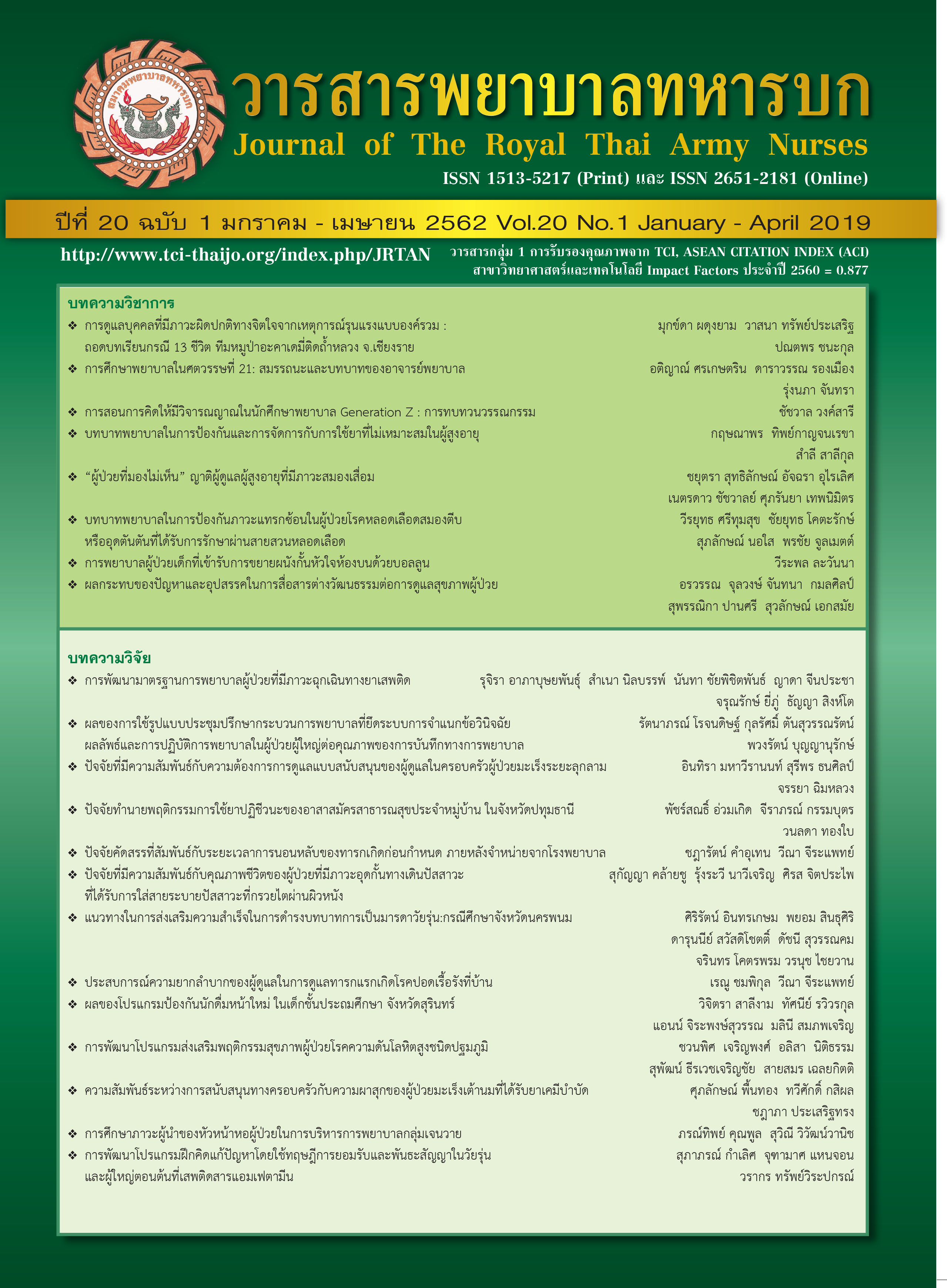Effects of Labor Support Program on Pain-Coping Behavior and Childbirth Experience among Primiparous Women Who Received Oxytocin
Keywords:
Labor support program, Pain-coping behavior, Childbirth experience, Primiparous women who received oxytocinAbstract
This quasi-experimental research aims to examine the labor support program on pain-coping behavior and childbirth experience among primiparous women who received oxytocin. Sample were 50 primiparous women who received oxytocin and attended at delivery room, Samudprakan Hospital. Purposive sampling was used to recruit sample. They were divided into an experimental group (n = 25) and a control group (n = 25). The experimental group received labor support program and routine nursing care. The control group received routine nursing care. Research instruments used to collect the data composed of personal and obstetric information, pain-coping behavior observation form and the perception of childbirth experience questionnaire. The data were analyzed by using descriptive statistics and independent t-test. The findings revealed that the experimental group had significantly higher pain-coping behavior both cervical dilation 5-7 centimeter and 8-10 centimeter than the control group (t48 = 15.88, p < .001 and t48 = 24.50, p < .001, respectively) and had significantly higher childbirth experience than the control group (t48 = 22.7, p < .001). This study confirmed the effective of the labor support program could increase pain-coping behavior and childbirth experience. Therefore, hospitals should be used this program to care laboring women who received oxytocin.
Downloads
References
Patyim S. Induction of labor. Siriraj Medical Bulletin. 2009; 2(1): 21-30. (in Thai).
Winichai, N., Serisathian, Y., Limruangrong, P., Phahuwatanakorn, W. Impacts of a labour support programme on the stress levels of primiparous parturients treated with oxytocin augmentation. Thai Journal of Nursing Council 2013; 28(4): 44-55. (in Thai).
Inkaew, S. Pain coping behavior during labor of hill tribe. Thai Journal of Nursing Council 2001; 16(2): 15-24. (in Thai).
Boonpong, M., Chunuan, S., Somsap, Y. Effects of empowerment and continuous support on psychological factors, pain coping behaviors, and birth outcomes. Songkla Med J. 2005; 23(1):37-47. (in Thai).
Parisunyakul, S., Baosoung, C., Prasitwatanasaree, P. Predictors of women’s perceptions of the positive childbirth experience. Nursing Journal. 2013; 40(Sup): 84-93. (in Thai).
Mukamurigo, J. U, Berg, M., Ntaganira, J., Nyirazinyoye, L., Dencker, A. Associations between perceptions of care and women’s childbirth experience: a population-based cross-sectional study in Rwanda. BMC Pregnancy and Childbirth. 2017; 17(181): 1-7.
Hodnett, E. D., Gates, S., Hofmeys, G., Sakala, C. Continuous support for women during childbirth. Cochrane Database Syst Rev. 2013; 15(7): 1-114.
Gagnon, A. J., Waghorn, K. One-to-one nurse labor support of nulliparous women stimulated with oxytocin. Journal of Obstetric, Gynecologic & Neonatal Nursing. 1999; 28(4): 371-376.
Chuchuay, B. The effects of continuous support program in labor by nurses on pain levels and pain coping behaviors in primiparous adolescents. [Thesis]. Songkla: Prince of Songkla University, 2015. (in Thai).
Junsopa, M., Baosoung, B., Parisunyakul, S. Effects of social support on labor pain and perception of childbirth experience among primiparous adolescent parturients. Nursing Journal. 2012; 39(4): 71-84. (in Thai).
Janruechai, D., Tiwato, K., Pangduanggaw, J. Impact of supportive & palliative care during childbirth on childbirth stress and childbirth experience perception of first-time mothers at Fan Ajaro Hospital. Thai Journal of Nursing Council. 2013; 28(1): 100-110. (in Thai).
Siriwan Sangin. Nursing care for laboring women with dystocia and assisting delivery. Chonburi: Chonburiprinting; 2016. (in Thai).
Siriburanapanont, B. A study of nursing support behaviors during labor perceived by nurse and parturients. [Thesis]. Bangkok: Graduate theses Mahidol University, 1997.
Escott, D., Spiby, H., Slade, P., & Fraser, R. B. The range of coping strategies women use to manage pain and anxiety prior to and during first experience of labour. Midwifery. 2004; 20(2): 144-156.
Sodsong, W. The effects of nursing support during labor on labor pain coping behaviors and the perception of childbirth experience of first-time mothers. [Thesis]. Bangkok: Mahidol University, 2005.
Baosoung, C., Rungreangsri, S. Effects of exposure to coping on perinatal pain and perception birth experience. [Thesis]. Chiang Mai: Chiang Mai University, 1994. (in Thai).
Subprasert, Y. Effects of nursing care using nonpharmacolgical technique of pain relief on pain coping behaviors during delivery, duration of labor and perception of childbirth experience in primiparas. [Thesis]. Bangkok: Chulalongkorn University, 1998. (in Thai).
Chaleoykikitti, S., Kamprow, P., Promdet, S. Patient safety and quality of nursing service. Journal of the Royal Thai Army Nurses. 2014; 18(1): 29-38 (in Thai).
Sukkay, V., Baosoung, C., Sansiriphun, N. Effects of labor support on pain and pain coping among parturients undergoing oxytocin augmentation. Journal of Public Health an Education. 2018; (19): 49-60. (in Thai).
Downloads
Published
How to Cite
Issue
Section
License
บทความหรือข้อคิดเห็นใดใดที่ปรากฏในวารสารพยาบาลทหารบกเป็นวรรณกรรมของผู้เขียน ซึ่งบรรณาธิการหรือสมาคมพยาบาลทหารบก ไม่จำเป็นต้องเห็นด้วย
บทความที่ได้รับการตีพิมพ์เป็นลิขสิทธิ์ของวารสารพยาบาลทหารบก
The ideas and opinions expressed in the Journal of The Royal Thai Army Nurses are those of the authors and not necessarily those
of the editor or Royal Thai Army Nurses Association.






